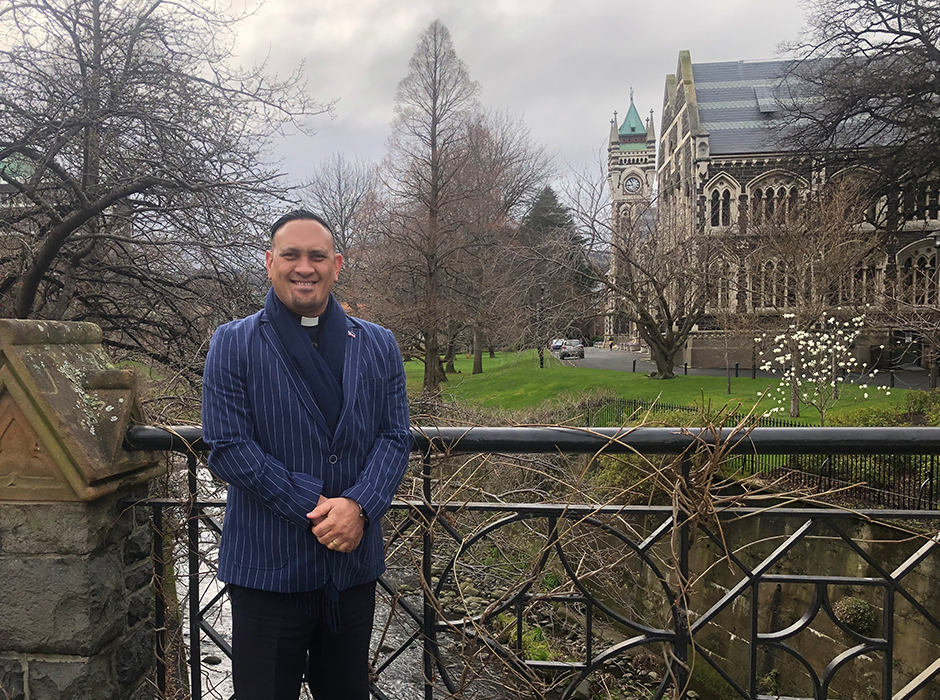
Doctoral graduand Te Hira Paenga wrote his thesis on the links between kapahaka and theology entirely in Te Reo, a first for Otago's Theology Programme.
Writing a doctoral thesis entirely in Te Reo is no easy task. And while it has been done before, Te Hira Paenga is the first at Otago to write one through the Theology Programme.
His thesis is also the first to analyse the links between Māori performance art, called kapahaka, and theology.
Te Hira feels Aotearoa and the world’s perception of kapahaka is informed by the All Blacks and that it alludes to war, death and gruesome bloodshed.
While that is part and parcel of kapahaka, Te Hira’s area of study focused on the biblical values and Christian beliefs which are also a reflected through the same modes of haka. Kapahaka can be aggressive with protruding tongues, pūkana – opening eyes wide, and a stomping foot but it’s also used to portray Māori theology.
“I think that’s what’s unique about the art forms, kapahaka, and having a strong faith.
“Kapahaka is just a vehicle through which our people were able to express their faith and also make theological responses during the time that they lived amongst their people and within their communities.”
Te Hira examined 15 different kapahaka compositions dating from as far back as 1814. He analysed their texts, lyrics, musicology, actions and choreography.
As a child Te Hira attended a Te Kōhanga Reo, Te Kura Kura Kaupapa Māori and Te Wharekura (the first Māori total immersion primary and secondary school in Aotearoa) and then later the Auckland College of Education, Te Panekiretanga o Te Reo – The Institute of Excellence in the Māori Language, the University of Auckland, Te Whare Wānanga o Awanuiārangi and the University of Waikato where he graduated with first class honours and a Masters degree, but writing his thesis in Te Reo was “so challenging”.
Te Hira says he was researching a culture which prioritises oral language over written language, then putting his research into a structured essay format within which there are expectations around being linguistically correct.
“I had to push myself extremely hard, to drive and re-read over and over again. The subtle things like the commas, macrons and the addition of new Māori words and concepts were crucial as this was the first Te Reo thesis in Theology.”
Te Hira is grateful to his wife and supervisors Dr Karyn Paringatai and Dr Wayne Te Kaawa for assisting him with proofing and content knowledge.
Microsoft Word isn’t exactly user friendly or good with Te Reo Māori, he says.
“I had all these technical challenges, but you know, I guess that’s the mana, that’s the respect the mahi deserves.
“It’s funny, I was always thinking at the back of my mind it would have been so much easier to write in English. I mean, a heck of a lot easier.
“But I thought to myself… I owe it to my teachers and to my parents who invested in me back in the ‘80s to do it total immersion in Te Reo.”
Te Hira would like to one day put together an English translation so his work can be appreciated by a wider, international audience but he’s not setting a time frame for this.
The birth of Te Hira’s second child in 2006 led to him reflecting on his life. He decided he wanted his son to have a holistic and rich learning experience that featured both te ao Māori and te ao Karaitiana - the Christian world.
It was then he embarked on his theological education, initially through St John’s College in Tamaki Makaura Auckland.
Te Hira says he had heard “nothing but positive remarks” about Otago’s Theology Programme, which led to him undertaking his PhD.
He has just started in his new role at the Methodist Mission Northern where he is responsible for implementing Te Tiriti principles.
Te Hira will graduate on Saturday, 17 August.